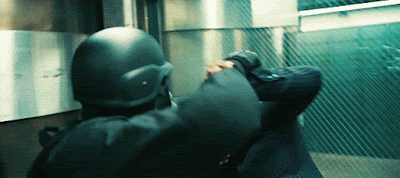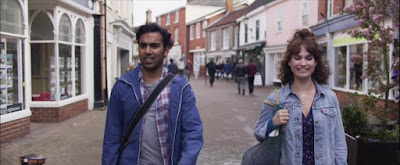 En-tropical Adventure ("Well, Try and Keep Up")
En-tropical Adventure ("Well, Try and Keep Up")or
We Live in a Twilight World ("And There Are No Friends who Understand This Movie, Either")
Christopher Nolan finally gets to do his "James Bond" movie, but—being Christopher Nolan—it had to be with a twist. In this case it's the twist you find in a möbius strip for his "Yeah, you can only release this in theaters" spy/sci-fi hybrid Tenet.
And, yeah, at least for the first four/five viewings, it should only be seen in theaters. Having access to a "Rewind" button would only confuse the issue. Plus, the details...the details...some things will get lost on a small screen given some of the intricacies going on, and at times the film is so disorienting that a large screen will make you a bit more sure of what you're seeing.
Nolan likes to stretch the underpinnings of his movies, fracturing time-lines, setting up nesting dolls of narratives, and investigating the possibilities of the image and editing while maintaining a forward momentum. Here, though, he has it both ways.
The film begins with a terrorist attack on a Ukrainian opera house, the perpetrators appearing from the stage as if part of the performance. How they planned all this without somebody noticing off-site that a major counter-terrorist operation was being set up in the general area is one of those post-"Dark Knight" "just-go-with-it" sleights of hand that directors have been taking advantage of when going for spectacle rather than logic. But, Tenet is so full of such things that it would be better to switch one's mind off if one is to experience any enjoyment out of this.
 | |
| During this sequence, Nolan has one train going forward and one back. It's a sort of subliminal training for what we're about to see. |
Short movie.
He wakes up...from a medically-induced coma. He's told that he survived the cyanide...that his jaw has been rebuilt*...but he is officially "dead" and he is to recover and has been chosen for a special assignment as his willingness to take the pill rather than give away secrets makes him a valuable asset. A further briefing tells him there WAS no cyanide...("eh?"), but that his devotion and the planned mission are real. He is given a gesture—interlocking fingers—and the word "Tenet" ("It'll open the right doors. Some of the wrong ones, too" he's told in the evasive generalized way that passes for exposition in the film).
 |
| "Is 'bunjee-jumpable' a word?" |
He's taken to a facility—for a second briefing—of what his next assignment (his first as a dead man) is, more specifically what the mechanics of the assignment entails. Turns out the issue isn't plutonium, but a possible WWIII is the end-game. This turns out, also, not to be true, not in the strictest sense, but a world-ending scenario is involved. He is shown what caused that little surprise of the backwards-bullet at the Kiev Opera House was all about: that bullet was manufactured in the future with a technology that allows it to move backwards through time by means of its own inverted entropy. If that's confusing, the scientist studying the ammunition has a handy piece of non-advice that will work for the viewer: "Don't try to understand it. Feel it." Especially when you point a weapon and the bullet jumps back into the gun. The kick-back must be intense.
Already, this is a little headache-inducing. But, it would help if we recall an episode of "The Big Bang Theory" (Season 3 Episode 22—"The Staircase Implementation") and Section 9 from Dr. Sheldon Cooper's Roommate Agreement: If one of the roommates ever invents Time Travel, the first stop has to aim exactly five seconds after this clause of the Roommate Agreement was signed. "Well, that's disappointing..." is Sheldon's reply when nobody shows up. If you laugh at that, you might be alright.Our Man in Confusion meets up with a British intelligence operative, Neil (Robert Pattinson), who helps him meet up with an arms dealer who gives him the low-down—the man who's behind (or in front of) all this reverse-entropy stuff is a Russian oligarch named Andrei Sator (Kenneth Branagh) who has seen the future and wants to exploit it to his own ends. The Protagonist (as he's called in the credits, but the arms-dealer tells him "You're the fresh-faced Protagonist, and you're as fresh as a daisy" so I will call him "Daisy") is told that he can get to Sator through his wife, Kat (Elizabeth Debicki), who is kept in a bad marriage by her error in selling Sator a fake Goya.
That is all the story I want to relate, because at this point...or later...or earlier (I'm not sure which) my understanding—or my willingness to understand—started to get a little hazy. My appreciation for what I was seeing didn't dampen, because the logistics and the talent to pull these things off (imagine if you will a "Bourne" type fight where one fighter is moving forwards and "the other" is moving backwards) and you begin to shake your head in wonder at the logistics needed to imagine, let alone carry off, such a sequence. There's a chase down a freeway involving cars moving forwards and backwards that is as twisty and GPS-frying as all get-out, and the final showdown with troops advancing and retreating (backwards) simultaneously has to be seen to believe.
 |
| "What happened here?" "It hasn't happened yet." |
 |
| It's happening... |
 |
| Kenneth Branagh counting backwards...or is it forwards? |
This leads to an audience-disconnect where you begin to suspect everything in the film of being untrue...or at least, the natural order of things. The Daniel Craig Bond's have made an entire through-line of its hero learning not to trust anything, not even his past...but, at least, he's still got his senses. Most movies endeavor—from their core—to create a belief in their reality; "Ignore the crewman out of frame with the pastry in his hand, this is true." Yes, there is music—from an unseen orchestra—and we're directing your point of view, so you don't see the reality we don't want you to see, but we're trying to make this as real as possible. Nolan is making as radical a move in breaking "the rules" as when Hitchcock killed off his leading lady half-way through Psycho: He's trying to make the "real" fantastical, in a way the Wachowski's with their computers couldn't with the Matrix movies.
It is mind-bending. And revolutionary. But, then Nolan has always played with the rules and mechanics of film, both in terms of story-telling and in its expectations. He can leave an audience gob-smacked...and deceived. Sometimes both, simultaneously.
Here's the same car-flip backwards and forwards...hope they called insurance before.
I don't know how advisable it is to question or not question the mechanics of what goes on here. In an era of "deep-fakes," one should always be suspicious of "face-value" and just not take things as they appear. Nor, can I interpret the measure of enjoyment you'll have in the movie if it doesn't make any sense. "Seeing is believing" is the old saw, and though I accepted the images, there was the doubter in my mind that kept kibitzing through the movie saying "that just wouldn't work." The answer, in retort, is to recall Hitchcock's rejoinder—"it's only a moovie."
At least, Tenet is entertaining enough that you don't want to re-live those 2 1/2 hours...backwards or forwards.
 |
| Here's a shot from the battle-climax of Tenet: Take a moment and think about what you're seeing here. It looks spectacular...but is it possible? |



















